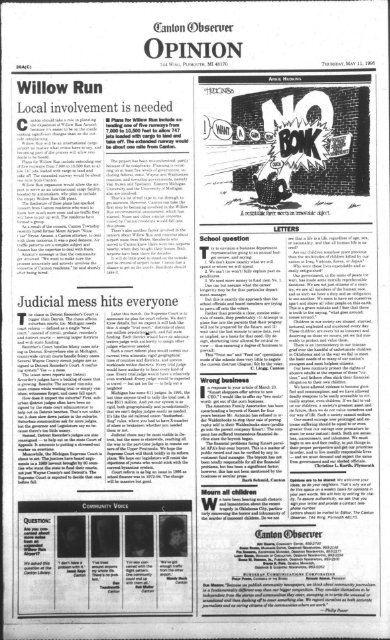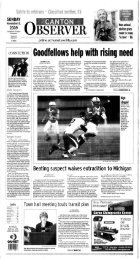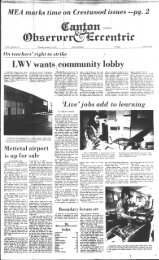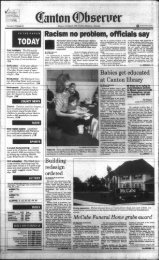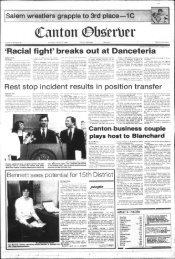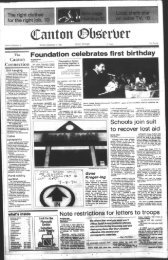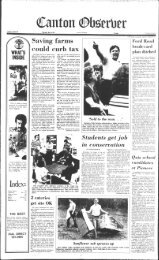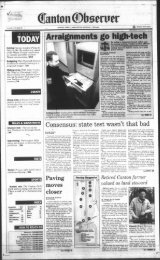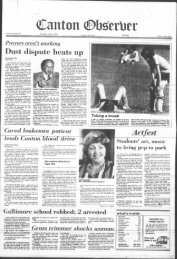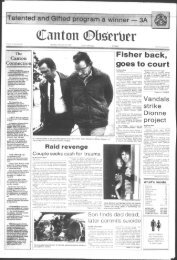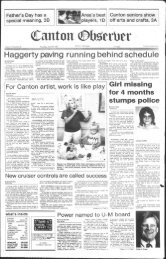Canton Observer for May 11, 1995 - Canton Public Library
Canton Observer for May 11, 1995 - Canton Public Library
Canton Observer for May 11, 1995 - Canton Public Library
Create successful ePaper yourself
Turn your PDF publications into a flip-book with our unique Google optimized e-Paper software.
20A(C)<br />
Willow Run<br />
Local involvement is needed<br />
CAnion should take a role in planning<br />
the expansion of Willow Run Airport<br />
because it's easier to be on the inside<br />
making significant changes than on the outside<br />
complaining<br />
Willow. Run will be an international cargo<br />
airport no matter what critics have to say. and<br />
becoming part of the process will allow residents<br />
lo be heard.<br />
Plans <strong>for</strong> Willow Run include extending one<br />
of five runways from 7.000 to 10,500 feet to allow<br />
747 jets loaded with cargo to land and<br />
take off The extended runway would be about<br />
one mile from <strong>Canton</strong><br />
Willow Run expansion would allow the airport<br />
to serve as an international cargo facility,<br />
boosted by automakers, who plan to include<br />
the empty Willow Run GM plant.<br />
The disclosure of those plans has sparked<br />
• x»ncrm from <strong>Canton</strong> residents who want to<br />
know how much more noise and air traffic they<br />
will have to put up with. The residents have<br />
<strong>for</strong>med a group.<br />
As a result of the concern. <strong>Canton</strong> Township<br />
recently hired <strong>for</strong>mer Metro Airport "Noise<br />
( zar" Bryan Amann. a <strong>Canton</strong> attorney, to deal<br />
with those concerns. It was a good decision Air<br />
t raffic patterns are a complex subject and<br />
Amann has the expertise to deal with them<br />
Amann's message is that the community<br />
get involved. "We want to make sure the<br />
process accurately and actively involves the<br />
concerns of <strong>Canton</strong> residents," he said shortly<br />
aftef being hired-<br />
<strong>Canton</strong> ffibsmrer<br />
OPINION<br />
• Plans <strong>for</strong> WUftow Run include axtencflng<br />
one of five runways from<br />
7,000 to 10,500 feet to afow 747<br />
jets loaded with cargo to land and<br />
take off. The extended runway would<br />
be about one mile from <strong>Canton</strong>.<br />
The project has been misunderstood, partly<br />
because of its complexity. Planning is occurring<br />
on at least five levels of government, including<br />
federal, state. Wayne and Washtenaw<br />
counties, and township governments, namely<br />
Van Buren and Ypsilanti. Eastern Michigan<br />
University and the University of Michigan<br />
also are involved<br />
That's a lot of red tape to cut through to<br />
get answers. However. <strong>Canton</strong> can take the<br />
first step by becoming involved in the Willow<br />
Run environmental assessment, which has<br />
started Noise and other similar concerns<br />
voiced by <strong>Canton</strong> residents would fall into<br />
this phase.<br />
There's also another factor involved in the<br />
concern about Willow Run and concerns about<br />
airport noise from Metro Residents who<br />
moved to <strong>Canton</strong> knew there were two airports<br />
nearby, when they bought their homes Both<br />
airports have been there <strong>for</strong> decades<br />
It will do little good to stand on the outside<br />
and be critical of airport noise. <strong>Canton</strong> has a<br />
chance to get on the inside Residents should<br />
take it.<br />
Judicial mess hits everyone<br />
The chaos in Detroit Recorder's Court is<br />
bigger than Detroit. The chaos affects<br />
suburban courts, too. Michigan needs<br />
court re<strong>for</strong>m — defined as a single "trial<br />
court." instead of circuit, probate, recorder's<br />
and district courts — serving larger districts<br />
and with state funding.<br />
Recorder's Court handles felony cases arising<br />
in Detroit. Everywhere else in Michigan,<br />
countywide circuit courts handle felony cases<br />
Several Wayne County circuit judges are assigned<br />
to Detroit Recorder's Court. A confusing<br />
system? Yes — a mess<br />
The latest news reports say Detroit<br />
Recorder's judges have a backlog of cases that<br />
is growing. Results: The accused commits<br />
more crimes while waiting trial or simply vanishes;<br />
witnesses <strong>for</strong>get; and cases fall apart.<br />
How does it impact the suburbs? First, suburban<br />
district judges often have been assigned<br />
by the state court administrator to<br />
help out on Detroit benches. That's not unfair,<br />
but it does slow down justice in the suburbs.<br />
Suburban communities ask <strong>for</strong> more judges,<br />
but the governor and Legislature say no because<br />
there's too tittle money.<br />
Second. Detroit Recorder's judges sre also<br />
reassigned — to help out on the state Court of<br />
Appeals. It amounts to putting a stressed-out<br />
worker on overtime.<br />
Meanwhile, the Michigan Supreme Court is<br />
about to act. Hie justices hare heard arguments<br />
in a 1969 lawsuit brought by 80 counties<br />
who want the state to fond their courts,<br />
not just Wayne County's and Detroit's. The<br />
Supreme Court is expected to decide that case<br />
foil.<br />
QUESTION:<br />
We ask edthts<br />
question at the<br />
Csnton Ubtwry.<br />
1 dont hove s<br />
problem with It.<br />
<strong>Canton</strong><br />
Later thin month, the Supreme Court is to<br />
announce its plan <strong>for</strong> court re<strong>for</strong>m. We don't<br />
' know details, but we expect it will look like<br />
this: A single "trial court." districts of about<br />
one million populatioi^ach. and full state<br />
funding. Each district would have an administrative<br />
judge with authority to assign other<br />
judges wherever needed.<br />
Such a court re<strong>for</strong>m plan would correct our<br />
current twin ailments: ngid geographical<br />
lines of counties and districts, and uneven<br />
workloads within districts Every trial judge<br />
would have authority to hear every kind of<br />
case. Every trial judge would have a relatively<br />
even workload. Every judge would be expected<br />
to travel — but not too far — to help out a<br />
neighbor.<br />
Michigan has some 6<strong>11</strong> judges. In 1991, the<br />
last time anyone tried to tally the total cost, it<br />
was $5<strong>11</strong> million. And yet our system is so<br />
rigid, both geographically and jurisdictionally,<br />
that we can't deploy judges easily as needed.<br />
It's l«k» the old railroad union "featherbedding"<br />
rules, where you had to have X-number<br />
of oilers or brake men whether you needed<br />
them or not.<br />
Judicial chaos may be most visible in Detroit.<br />
but the mess is statewide, reaching all<br />
the way to the part-time judges in remote corners<br />
of the Upper Peninsula. We hope the<br />
Supreme Court will think boldly in its re<strong>for</strong>m<br />
plans. We hope our legislators will resist the<br />
objections of jurists who would stick with the<br />
current byzantine system.<br />
Court re<strong>for</strong>m is ss big an issue in 1996 as<br />
school was in 1972-94. The change<br />
will be massive but good.<br />
COMMUNITY VOICE<br />
Tvs lived<br />
around airports<br />
my whole Wa<br />
There's no prot><br />
<strong>Canton</strong><br />
Turnery concerned<br />
with the<br />
flight pattern.<br />
Ons community<br />
could and up<br />
with them<br />
<strong>Canton</strong><br />
744 WING, PLYMOUTH, MI 48170<br />
WeVegot<br />
enough traffic<br />
from the other<br />
Csnton<br />
nmNSe.<br />
W<br />
School question<br />
ARKIE HUDKINS<br />
A itsistahic<strong>for</strong>ce nccta an. taawableciktfect.<br />
Try to envision a business department<br />
representative going to an annual budget<br />
review, and saying:<br />
1 We don't know exactly what we will<br />
spend or where we will spend<br />
2. We can't (or won't) fully explain past expenditures.<br />
3. We need more money to fund item No. 1.<br />
One can but assume what the career<br />
longevity may be <strong>for</strong> that particular department<br />
manager.<br />
But this is exactly the approach that the<br />
school officials and board members are trying<br />
to pawn off onto the voters<br />
Rather than provide a clear, concise rationale<br />
of needs, they predictably: (1) Attempt to<br />
place fear into the parents that their progeny<br />
will not be prepared <strong>for</strong> the future, and (2)<br />
wait until the last minute to issue data, real<br />
or implied, as a basis <strong>for</strong> that need. (By design,<br />
shortening time allowed <strong>for</strong> critical review<br />
— thus ensuring a degree of fuzziness to<br />
prevail).<br />
This Trust me" and "Feed me" operational<br />
mode of the schools does very little to negate<br />
the current distrust (disgust) felt by the voter.<br />
C. Lingg, <strong>Canton</strong><br />
Wrong business<br />
In response to your article of March 23,<br />
"Kmart shoppers offer advice to new<br />
CEO," I would like to offer my "two cents"<br />
worth get out of the porn business.<br />
The American Family Association has been<br />
spearheading a boycott of Kmart <strong>for</strong> four<br />
years because Mr. Antonini has refused to order<br />
Waldenbooks to stop their sale of pornography<br />
sold in their Walden books store (profits<br />
go into the parent company Kmart). The company<br />
suffered tremendous decline<br />
since the boycott began.<br />
The financial problems facing Kmart parallel<br />
AFA's four-year boycott. This is a matter of<br />
public record and can be verified by any investment<br />
fund manager. The boycott has not<br />
been totally responsible <strong>for</strong> all the financial<br />
problems, but has been a significant factor,<br />
however, this has not been mentioned by the<br />
business or secular press.<br />
Barb Schmid, <strong>Canton</strong><br />
Mourn all children<br />
We have been hearing much rhetoric<br />
and lamentation about the recent<br />
tragedy in Oklahoma City, particu-<br />
Uirly concerning the horror and inhumanity of<br />
the murder of innocent children. Do we not<br />
LETTERS<br />
THURSDAY, MAY II, <strong>1995</strong><br />
see that a life is a life, regardless of age. sex,<br />
or nationality, and that all human life is sacred?<br />
Are our children somehow more precious<br />
than the multitudes of children killed by our<br />
nation in Iraq, Vietnam. Korea, or Japan''<br />
Why were these lives expendable and so<br />
easily extiguished?<br />
Our government, in the name of peace (or<br />
war), has made some morally reprehensible<br />
decisions. We are not just citizens of a country.<br />
we are all members of the human race,<br />
and as such we have a duty and an obligation<br />
to one another. We seem to have set ourselves<br />
apart and above all other people on this earth.<br />
Tliis is a grave mistake and I fear that there<br />
is truth to the saying, "what goes around,<br />
comes around."<br />
Children in our society are abused, starved,<br />
tortured, neglected and murdered every day.<br />
These children are every bit as innocent and<br />
deserving as those we mourn, yet we fail miserably<br />
to protect and value them.<br />
There is an inconsistency in our intense<br />
grief over the handful of un<strong>for</strong>tunate children<br />
in Oklahoma and in the way we fail to meet<br />
the basic needs of so many of our nation's<br />
youngest and most helpless citizens.<br />
Our laws routinely protect the rights of<br />
abusive adults at the expense of these "victims,"<br />
and fathers often shirk their financial<br />
obligation to their own children<br />
We have allowed violence to become glorified<br />
and commonplace, and we have allowed<br />
deadly weapons to be easily accessible to virtually<br />
anyone, even children. If we fail to value<br />
our children, a society's greatest asset and<br />
its future, then we do not value ourselves and<br />
our way of life. Such a society cannot endure.<br />
Our moral outrage over prolonged and extreme<br />
suffering should be equal to or even<br />
greater than our outrage over premature instant<br />
(or near instant) death. Both are senseless,<br />
unnecessary, and inhumane. We must<br />
begin to see and face reality, to put things in<br />
their proper perspective and get our priorities<br />
in order, and to live morally responsible lives<br />
— and we must demand and expect the same<br />
from government and our elected officials.<br />
Christine L. Kurth, Plymouth<br />
(ganton (Dbseroer<br />
Opinions are to be ehared: We welcome your<br />
Ideas, as do your neighbors. That s why we offer<br />
this space on a weekly basts <strong>for</strong> opinions in<br />
your own words. We will help by editing <strong>for</strong> clarity.<br />
To assure authenticity, we ask that you<br />
sign your letter and provide a contact telephone<br />
number.<br />
Letters should be mailed to: Editor, The <strong>Canton</strong><br />
<strong>Observer</strong>. 744 Wing, Plymouth 48170.<br />
Jaw COUNTS, COMMUMTT Eorou. 459-2700<br />
, MMMM Eonoa, Oeamvc* Mrww*is— ft. POST. QCNKRAI MANAOCN.<br />
Oestsvew 4 Ecctwnac Nwetfw, 953-2252<br />
Bust) aa AN COMMUNICATIONS COBBOBATION<br />
, CHAMMAM or TMI SOAAO Wiawsa Aawus, PMSOCWT<br />
; "Because we publish community newspapers, we think about community journalism<br />
in a fundamentally different way than our bigger competition. They consider themselves to be<br />
independent from the stories and communities they cover, swooping in to write the unusual or<br />
sensational and then daehing off to cover something elee. We regard ourselves as both accurate<br />
journalists and as earing dtieens of the communities where we work.'<br />
— Philip Power<br />
The <strong>Observer</strong>! THURSDAY. MAY <strong>11</strong>, <strong>1995</strong><br />
POINTS OF VIEW<br />
America's changes start at grass roots level<br />
I<br />
t seems thst no sooner than someone<br />
ssys, 'Things just can't get any<br />
worse," some new crisis occurs to<br />
shock the public into a new level of<br />
awareness of just how out of control<br />
and unpredictable the crisis in Americs<br />
has become.<br />
Persons) experience at a professional<br />
level compelled me to write an essay<br />
titled "The Secret Sabotage Inside of<br />
Black America," which was copyrighted.<br />
earlier this year.<br />
The document concludes with a<br />
model offered as sn alternative to the<br />
destruction in black America aa well as<br />
in mainstream America.<br />
I named this radical solution to our<br />
growingxrrisis The Master Builders<br />
Roll-Csll For Social Accountability, of<br />
which this editorial is the first official<br />
public exposure.<br />
The plan calls <strong>for</strong> a public roll call of<br />
the nation's governors, county administrators<br />
and city mayors. The goal<br />
is to create standardised gosls and systems<br />
of social accountability across<br />
America.<br />
Cities should be divided into districts,<br />
precincts or areas. Then, their<br />
ef<strong>for</strong>ts to develop the community<br />
should be highly publicized.<br />
The theory here is that if Detroit is<br />
in highly publicized competition with<br />
Grand Rapids to organise its citizens,<br />
including prisoners and ex-offenders as<br />
well as leaders and average citizens, we<br />
will shape the culture of consciousness<br />
<strong>for</strong> safety, unity and welfare across po-<br />
GUEST COLUMNIST<br />
LUKE LAMPWN<br />
• CMes should bo divided<br />
Into districts, precincts or<br />
srsns.<br />
pu 1st ions.<br />
The plsn could chsnge America's ap<br />
prosch to crisis management and social<br />
development by using strategies now<br />
used to promote sports and market<br />
goods and services.<br />
The plan calls <strong>for</strong> oommunitywide<br />
and nationwide motivational campaigns<br />
of standardized social participation<br />
and collaboration to restore community<br />
competence, confidence and<br />
credibility in America to rich and poor<br />
communities.<br />
It would also provide <strong>for</strong> a structure<br />
to organize, research, and manage social<br />
patterns of individual and group<br />
(P,C)21A<br />
behavior and organize volunteer systems<br />
of community management in cooperation<br />
with government agencies at<br />
local, state and national levels.<br />
We may reverse the cycles of social<br />
disorganization, destruction and crisis<br />
I at the point that we invest the same<br />
levels of planning, ef<strong>for</strong>t and enthusiasm<br />
that ia invested in political campaigns<br />
and athletic promotions. But<br />
probably not a minute sooner.<br />
Luke Lamphin Jr. is a <strong>Canton</strong> resident<br />
and social worker in the Detroit<br />
area. The <strong>Observer</strong> uses guest columns<br />
on a regular basis. For more in<strong>for</strong>mation<br />
about writing one, call Jeff Counts,<br />
the editor, at 459-2700.<br />
Legislators right in seeking to cap suit damages<br />
h-h-h-h. Don't give Geoffrey<br />
Fieger this in<strong>for</strong>mation. It would Sspoil<br />
his dreams and shock him<br />
into a numerical reality.<br />
Fieger is a Southfield trial lawyer<br />
who makes a living suing doctors and<br />
manufacturers who allegedly injure his<br />
clients. That kind of law is called<br />
• tort." There is a big movement, nationally<br />
and in Michigan, to re<strong>for</strong>m tort<br />
law Naturally. Fieger is against it and<br />
professes not to understand the oppo<br />
sition.<br />
The re<strong>for</strong>mers never have proposed<br />
that the injured shouldn't be compensated<br />
<strong>for</strong> actual injuries. Those are<br />
known as "economic" dartiages. They<br />
include medical treatment, wheelchairs.<br />
lost wages and the like. They<br />
are noncontroversial<br />
The controversy is over "non-economic"<br />
damages; known as pain and<br />
suffering. A state Senate bill would<br />
limit P&S damages to $280,000 in police<br />
chase cases. Horrors, says Fieger,<br />
chanting the trial lawyer's litany: "Let<br />
the jury decide." He goes on to say it's<br />
just the insurance companies, not the<br />
city or the business or the professional<br />
person who must pay<br />
To test that proposition, let us take a<br />
simple but realistic case from the real<br />
world. Let's say you and I and eight<br />
others are merchants of Venice, and<br />
each owns a caravel, a total of 10. We<br />
send those caravels on trading expeditions<br />
to Spain and the Middle East,<br />
but Mediterranean pirates get one in<br />
10<br />
So we decide to share the risk. Each<br />
caravel is worth 10,000 lira, and one<br />
won't return. If we each pay a "premium"<br />
of 1,000 lira, we have a reserve of<br />
10.000 lira The unlucky entrepreneur<br />
who loses a ship to pirates collects.<br />
Now let's let the plot thicken. Suppose<br />
one shipper says his caravel had<br />
30,000 or 50,000 or 100,000 lira worth of<br />
cargo. We have only 10,000 in the pot.<br />
The shipper kicks and screams and<br />
moans and demands 100,000 lira. The<br />
doge's jury says the rest of us mast<br />
pay. But it's the last time we'll do business<br />
with that whiner.<br />
Non-economic damages, or pain and<br />
suffering, are much like that. How do<br />
we calculate our premiums when we<br />
have no advance idea what the damages<br />
will be?<br />
That's how insurance works. To calculate<br />
each insured's premium, we<br />
must have some calculable idea of<br />
Fund state's universities<br />
using policy, not politics<br />
One annual spring ritual in Michigan is<br />
the squabble over how the $1.3 billion<br />
budget <strong>for</strong> higher education gets doled<br />
out among the state's 15 public universities.<br />
With no coherent state policy driving appropriations<br />
decisions, the process has become the<br />
single most totally parochial donnybrook in<br />
Lansing. Legislators pick partisan sides. Those<br />
representing Lansing favor Michigan State University,<br />
and those from Ann Arbor push the<br />
University of Michigan. Or Spartan alums<br />
square off against Wayne State graduates.<br />
But over the past decade or so, a kind of tacit<br />
gentlemen's agreement has emerged that put at<br />
least the Big Three — U-M, MSU and WSU —<br />
at rough parity. If U-M got a 4-percent increase,<br />
so too would MSU and WSU.<br />
This year, however, Gov. John Engler<br />
surprised everybody by proposing a bud&t with<br />
sdditionsl special appropriations of $10 .1 million<br />
<strong>for</strong> MSU. $4.2 million <strong>for</strong> Western Michigan<br />
University and $1 million <strong>for</strong> Grand Valley<br />
State University. The net effect was to pick<br />
three winners (each receiving around a 6-percent<br />
increase) and 12 losers (each receiving<br />
around 3 percent, below the cost of inflation).<br />
Right away, talk erupted of special deals and<br />
political deck-stacking. Gov. Engler was intimately<br />
involved in picking new MSU President<br />
Peter McPherson. Rep Don Gilmer, who will be<br />
a m e m b e r of the all-powerful conference committee<br />
on higher education appropriations, is<br />
from Augusts, near WMU's campus in Kslama<br />
aoo. And Grand Valley, located nesr Grand<br />
Rapids, benefited from the general west side-ofthe<br />
state tilt of the Engler Administration^<br />
A period of ferocious - even by higher educetion<br />
appropriations standards - lobbying ensued<br />
Lad by Sen John Schwarz, a physician<br />
and alum of both U-M and WSU. and chair of<br />
the Senete Approprietiona subcommittee on<br />
higher ad, a compromise proposal emerged<br />
week that would give all universities general in<br />
cveaaee of 6 percent while maintaining the special<br />
outlays <strong>for</strong> the three winners.<br />
State revenue projections will come outnext<br />
Monday. Senete and House leaders will meet<br />
with Engler in the middle of next week to set<br />
Plainly. Michigan needs a policy-driven way<br />
to allocate funds to higher education. Political<br />
srm-twisting Is hardly a sensible basis <strong>for</strong> sup<br />
the greet universities on which much ot<br />
*l foture —<br />
PHILIP POWER<br />
The baais can be found in the report of the<br />
Commission on the Future of Higher Education<br />
in Michigan, published in 1984. This bipartisan<br />
panel, which included <strong>for</strong>mer MSU President<br />
John Hannah, unanimously recommended a<br />
funding system based on twin facts:<br />
a Naturally, the roles and missions of Michigan's<br />
universities differ. Research universities<br />
do not pretend to do the same thing as regional<br />
state colleges.<br />
B So, too, do costs per student. It does cost<br />
much more to educate a doctor at U-M than it<br />
does to train a lab technician at Oakland Community<br />
College or Schoolcraft College.<br />
The brilliance of the commission's report was<br />
to suggest thst Michigan's funding targets <strong>for</strong><br />
each type of university be set by examining how<br />
other states support their peer institutions -<br />
that Is, those with similar roles and missions.<br />
If, <strong>for</strong> exsmple, other states support their regional<br />
colleges st a level of $X per student, this<br />
should become a target <strong>for</strong> state funding in<br />
Michigan.<br />
You don't need a Ph.D. in rocket science to<br />
realize that once the current funding donnybrook<br />
is over, Michigan should adopt a rational<br />
system <strong>for</strong> supporting higher education based<br />
on the commission's model.<br />
Phil Power is chairman of the company that<br />
owns this newspaper He also is a regent of the<br />
U-M and was a member of the Commission on<br />
the Future of Higher Education in Michigan<br />
His Touch-Tone voice mail number is (313) 963-<br />
2047, Ext 1880. '<br />
TIM RICHARD<br />
what the loss might be. It's this concept<br />
Fieger professes to be unable to<br />
understand, repeatedly and at length,<br />
when he hassled the Senate Judiciary<br />
Committee last week.<br />
It's a convenient misunderstanding<br />
because plaintiffs' lawyers who work<br />
on a contingency typically collect onethird<br />
of the jury award (In fairness. I<br />
must report Fieger said, "I,don't do it<br />
<strong>for</strong> the money any more. 1 do it because<br />
it's right." Yeah, sure.)<br />
Remember, the question isn't calculating<br />
economic damages. It's calculating<br />
"pain and suffering."<br />
• The controversy Is over "non-economic" damages,<br />
known as pain and suffering. A state Sonnto bill would<br />
limit PAS damages to $280,000 in police chase casos.<br />
Horrors, says Roger, chanting the trial lawyer's Htany:<br />
'Let the Jury decide.'<br />
Some folks are stoic about pain and<br />
suffering. They'll <strong>for</strong>ce a smile and pre<br />
tend it doesn't hurt. They may go off in j<br />
a corner and bear their wounds quietly,<br />
like our poodle who avoided UB <strong>for</strong> two<br />
days after he'd suffered a gash in the<br />
side of his neck.<br />
Other folks make an operatic production<br />
out of it. They can emit melancholy<br />
wails that will rip your heartstrings.<br />
I recollect a drug addict, a veritable<br />
bum and drag on the public<br />
exchequer, a man who had <strong>for</strong>saken his<br />
relatives. When he died, relatives emerged<br />
from the woodwork demanding<br />
tens of millions of dollars <strong>for</strong> the loss of<br />
the dear, dear departed.<br />
Should pain and suffering be judged,<br />
as Fieger would have it, by a jury lis-<br />
tening to the sighs and moans of the<br />
injured or the survivors? Juries don't<br />
calculate actuarial tables. They don't<br />
tally how many $7 million sobs, $5 million<br />
sobs and $250,000 sobs they will<br />
hear in a year. They determine one case<br />
at a time. Juries can't judge pain and<br />
suffering.<br />
Our lawmakers are moving in the<br />
right direction when they say, hey,<br />
there's got to be a monetary cap on<br />
what a jury calls "pain and suffering<br />
But don't tell that to Geoffrey Fieger<br />
He doesn't understand these things, by<br />
his own admission, and doesn't want<br />
to.<br />
Tim Richard reports on the local implications<br />
of state and regional events<br />
His Touch-Tone voice mail number is<br />
(313) 953-2047ext. 1881.<br />
BACK TO BASICS AND THE BASIC IDEA<br />
IS SAVINGS!<br />
SAVE 30% - 40%<br />
AND RECEIVE<br />
ONE YEAR<br />
INTEREST FREE FINANCING<br />
or<br />
WE'LL PAY YOUR<br />
6% SALES TAX!<br />
SALE ENDS MAY 20,<strong>1995</strong> AT 5:30 P.M.<br />
We will be closed Sunday, <strong>May</strong> 14, <strong>for</strong> Mother's Day<br />
• Pennsylvania House<br />
• Bob Timbertake<br />
• King Hickory<br />
• Hekman<br />
• Hitchcock<br />
• Howard Miller<br />
Nichols & Stone<br />
Lexington<br />
Coiraver ,<br />
Stlttel<br />
Jasper Cabinet<br />
I.M. David<br />
• Harden<br />
• Bradington-Young<br />
•Hooker<br />
• SUgh<br />
• Canal Dover<br />
«Superior<br />
• Butler<br />
Hancock S Moore<br />
Charleston Forge<br />
Crattmark<br />
Dinaire<br />
Restonic<br />
AIM<br />
Mon, Thurs, Ffi. 9:30-900. lues.. Wed., Sot. 9 30-5 30; Open Sun. 1-5<br />
<strong>11</strong> Classic Interiors<br />
20292 Mfddleben. Livonia • South of 8 Mile • 474-6900<br />
^ AI aecountt Aic OB Manuiociuen fcigoorted Betas Paces • ow*x» tdm eacuded «<br />
• OBoi no* wvan corsincNcift


